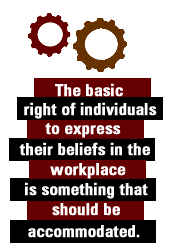Respect in the Workplace
Stuart J. Lark March/April 2003
Getting your Trinity Audio player ready...

Illustration by William Riser

Many religious persons at some point in their working life encounter a conflict between a requirement of their job and their religious conscience. Employers sensitive to the religious convictions of their employees often make an effort to alter the job requirements so as to remove this conflict. However, some employers fail to make such changes, even when doing so would impose no significant cost on the employer. I would like to share two examples that have recently come to our attention at the Christian Legal Society.
A caseworker employed by a large social service agency asked to be excused from cases involving assistance for people seeking abortion services. The employee believed that providing such assistance violated his religious convictions. Although such cases constituted only a small portion of this caseworker's workload and there were plenty of other caseworkers available to handle these cases, his request was refused. The agency stated that its policy was that all caseworkers must be able to handle all cases.
However, many of the agency caseworkers cannot handle cases involving Spanish-speaking clients because the workers do not, and are not expected to, speak Spanish. Although the agency makes an exception for language, one that significantly impairs its service quality, it was not willing to accommodate the sincere religious beliefs of this caseworker.
As a result of the refusal to accommodate, the caseworker quit his job in order to preserve his religious conscience.
In the second situation, an employee was pressured by a large telecommunications company to work with pornographic material that was being delivered by the company as a new subscriber service. He refused, based on his Christian beliefs. Although he made several attempts to raise this issue with the company's personnel department, he was unable to reach anyone who would assist him. As a result, the employee is miserable and depressed at work, ignored by management, and subject to criticism from coworkers. He expects that eventually he will have to resign because of the mental anguish he is suffering.

These cases (and others) raise the fundamental issue of whether, and to what extent, private employers should be required by law to accommodate the religious practices and beliefs of their employees. The proposed Workplace Religious Freedom Act (WRFA) addresses this issue by requiring employers to provide an accommodation unless doing so would result in "significant difficulty or expense" for the employer.1 For reasons I will discuss here, we think this standard reflects sound social policy regarding the religious liberty interests of our citizens and will protect believers from having to choose between their conscience and a career in an increasingly diverse work environment.2
Religious Accommodation as a Social Value
The rule set forth in WRFA makes an important statement about the respect our society should give to the religious beliefs and practices of our citizens. This respect accords with basic Christian theology. To say that people are created "in God's image" is to say, in part, that each person has a religious "impulse" or "drive." People are most fully human when this religious impulse flourishes as God intends. As a prayer of Augustine's says: "Thou hast formed us for Thyself, and our hearts are restless until they find rest in Thee."
But this flourishing cannot be coerced; it's a matter of faith, freely adopted and expressed. Evangelical thinkers at the time of the founding trumpeted this truth. Isaac Backus, a Baptist minister, stated that "God is the only worthy object of all religious worship, and nothing can be true religion but a voluntary obedience unto his revealed will."3 A similar notion formed the basis for the Virginia Bill for Establishing Religious Freedom, authored by Thomas Jefferson (not an Evangelical), which asserted that government attempts to influence religion violated "the plan of the Holy Author of our religion, who being Lord of both body and mind, yet chose not to propagate it by coercions on either." Taken together, these principles indicate that society should make as much room as possible for the voluntary religious practices and beliefs of its citizens.4 Such respect promotes the highest aspirations of God for His people.
The First Amendment to the United States Constitution establishes certain fundamental principles regarding the respect that government must pay to the private religious choices of citizens.5 The free exercise and establishment clauses of the First Amendment enforce the principle that government action should be constrained so as to minimize its influence on the private religious choices of citizens.5 In furtherance of this principle, many religious liberty advocates argue that the First Amendment requires any government action that burdens religious practice to be justified by a compelling governmental interest.6

Respect for private religious exercise should apply not only to government action, but also to the private workplace, where most people earn their livelihood. Of course, competing social interests related to the rights of private employers must also be considered. Nevertheless, private employers are subject to a wide range of government regulations related to other social interests such as family responsibilities, protection of the environment, and the promotion of public safety. Such regulations impose significant costs on employers. We believe that respect for the religious "impulse" of workers is a social value at least as important as these other social values. Of course, because a religious impulse cannot be defined objectively, it is impossible to create a uniform rule for all situations. In this regard, we think that the WRFA rule establishes an appropriate balance, to be applied on a case-by-case basis, between the religious aspirations of employees and the business interests of their employers.
What About Religious Employers?
The WRFA rule would not apply to religious employers, because they are exempt from the Title VII provisions that apply to religion.7 This exemption, which prefers the religious associational interests of a religious employer over the religious exercise of an employee, is necessary to preserve religious liberty. Associations formed around religious conviction cannot be separated from the religious liberty interests of the individuals who comprise such associations. If the law were to give one individual a trump card over the religious associational rights of others, the result would undermine all religious liberty protection. Put differently, religious associations need greater protection because the religious liberty interests of individuals cannot be protected without respecting and protecting the associations that individuals may form around shared religious conviction.
Historically, the most common conflicts between religious exercise and work requirements have involved Sabbath and holy days and religious dress. However, conflicts are arising with increasing frequency in other areas.
Rules Limiting Religious Expression
Some employers have adopted rules prohibiting employees from sharing their faith (or proselytizing) with coworkers. Such rules are meant to protect workers from religious harassment, but they are overbroad.8 The expression of one's faith to another person, and any other discourse on the subject, is not a disfavored category in social conversation. The emphasis, therefore, should be on the manner, as opposed to the content, of the expression. If the manner of presentation causes consternation to other workers, then the employer may have a valid interest in prohibiting it. But the basic right of individuals to express their beliefs in the workplace and enter into dialogue with others is something that should be accommodated.
Social Values
Another area of conflict involves social values promoted by the employer that are in conflict with those of the employee. This conflict may arise in certain so-called diversity training seminars at which employees may feel that they are required to participate in and actively embrace certain moral concepts. The most common example at present relates to sexual orientation. Employees who believe as a matter of religious conviction that homosexual conduct is wrong often object to being required to participate in seminars that validate such conduct. Alternative arrangements should be made for such employees unless the employer can demonstrate that real harm (i.e., a significant difficulty or expense) would result.
Sanctity of Life Issues
Finally, issues related to the sanctity of life are likely to raise significant conflicts in the future. Many persons who oppose abortion on religious grounds work in health-care positions. Such persons may object to participating in abortion-related activities, whether such activities consist of actual abortions, dispensing of drugs that are abortifacients, or merely referring clients to abortion providers. Recent developments related to stem cell research and "therapeutic" cloning, both involving the destruction of human embryos, are certainly going to create conflict for persons who may be required to assist in such activities or to work with the results of such research. Finally, activities related to physician-assisted suicide (or euthanasia) pose similar problems.
Religious persons today work in a culturally and religiously diverse environment. This diversity creates an increased potential for conflict between workplace requirements and individual religious exercise. The fundamental principles of religious pluralism upon which this country was founded require employers to respect and accommodate, where possible, the religious exercise of their employees. The standards set forth in WRFA reflect this country's commitment to religious pluralism and would provide important protection for religious employees.

Stuart J. Lark is counsel for legislative affairs and appellate advocacy, Christian Legal Society, Annandale, Virginia.
1 WRFA has been introduced in the Senate (S. 2572) under the lead sponsorship of Senators John Kerry (D-Mass.) and Rick Santorum (R-Pa.).
2 See also James Standish, "Working for Freedom: Why Legislation Is Necessary to Protect Religious Freedom in the American Workplace," Liberty Online, May 2002.
3 I. Backus, "A Declaration of the Rights of the Inhabitants of the State of Massachusetts-Bay in New England" (1779), in Isaac Backus on Church, State and Calvinism: Pamphlets, 1754-1789, at 487 (W. McLaughlin, ed., 1968).
4 It is not possible to separate an individual's religious beliefs from religiously mandated or motivated conduct or practice. To say that someone is free to hold a religious belief but not to practice or observe the religion in terms of what that religion mandates or motivates them to do is effectively to say that they cannot practice that religion.
5 See generally Douglas Laycock, "The Underlying Unity of Separation and Neutrality," Emory L. J. 43, 46 (1997).
6 Although the U.S. Supreme Court has declined to apply this standard to neutral and generally applicable laws, Employment Division v. Smith, 494 U.S. 872 (1990), the standard nevertheless applies to the federal government under the Religious Freedom Restoration Act (42 U.S.C.